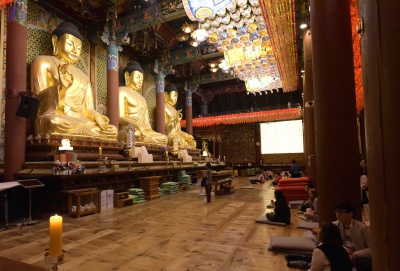This week brings us to chapter 14 in Proverbs. Although there are many words of wisdom to be found within this chapter, I’d like to pull out the proverbs that pertain to a healthy fear of the Lord.
The faithless will be fully repaid for their ways, and the good man rewarded for his (14:14).
Last weekend a friend and I went to Seoul to see a lantern festival, which as it turns out, was mostly a celebration of Buddha’s birthday. The photographer in me begged to capture images of people and the festivities, even if it meant stepping inside the Jogyesa Temple, where three enormous statues of Buddha towered above the bowing Koreans below. But after about five minutes inside, the Christian in me told me to get out.
In the five minutes I spent inside this temple I watched a plethora of people file in and out, bowing profusely to the Buddhas before them. Others laid out mats in front of the golden statues, upon which they bowed over and over again. I wondered why, if Buddha is not considered a god, people were bowing to him — it turns out, those who bow are acknowledging the fact that the Buddha attained the perfect and supreme Enlightenment. The whole scene seemed reminiscent of the worshiping of false idols in the Old Testament, and in that instant, it was as if I could feel God’s burning anger directed straight at me for walking into such a place.
Out front, people waited in line to pay an elaborately dressed woman to pour a scoop of water over a smaller, but equally as elaborate, statue of Buddha. I later learned that this wasn’t water at all, but rather scented tea. The tea is poured on the statue in remembrance of Buddha’s birth, when stories say two streams of perfume from the sky bathed him and his mother.
And so, according to my research, all that bowing and tea pouring isn’t an act of worship to Buddha. But I am confident that such devotion to a human man will only lead to disappointment. Not one of the visitors to the temple that night had reached “Enlightenment.” I know this because according to Buddhism, those that do reach enlightenment are not reborn — which means we’ll never be able to ask someone what it’s like. What’s more, I doubt any person there, including the monks, would tell you that they are anywhere even close to achieving perfect insight and understanding.
The Bible tells us that no one is righteous, not even one, and those who do not wake up to this fact will perish. Scripture gives us many descriptive verses which explain how the faithless with die.
The Lord will swallow them up in his wrath,
and his fire will consume them. Psalm 21:9
But the wicked will perish:
Though the Lord’s enemies are like the flowers of the field,
they will be consumed, they will go up in smoke. Psalm 37:20
May you blow them away like smoke—
as wax melts before the fire,
may the wicked perish before God. Psalm 68:2
Surely they are like stubble;
the fire will burn them up.
They cannot even save themselves
from the power of the flame. Isaiah 47:14
There are verses like this all throughout the Bible. Know that the soul does not belong to us. It cannot be reborn into new a life so that we can continue to improve ourselves: to become enlightened. “For every living soul belongs to me, the father as well as the son – both alike belong to me. The soul who sins is the one who will die” (Ezekiel 18:4).
The other words of wisdom from Proverbs, chapter 14 which pertain to a fear of the Lord is verse 26.
He who fears the Lord has a secure fortress, and for his children it will be a refuge (14:26).
With a healthy fear of the Lord, God’s children tend to make wise decisions. Of course, we often fail, but the driving force of our moral compass is not whether or not our boss is watching but knowing that God is. What you might think is hidden behind closed doors or pressed behind the lips of a trusted friend is open scandal in Heaven. God is always with His children, at all times and in all locations.
With that said, we will be judged according to our works on Earth. Not that our works will determine whether we will we rewarded with eternal life in Heaven, but that once we are saved (or born again) works naturally follow that change in our life. In other words, if you are a child of God, you will fear Him as you once feared your mother or father’s wrath, but you will also love Him and want to act according to His will, just as you once strove to please your parents. This new nature will be the motivating force behind the way you live your life.
Because of our human nature, a child of God will never actually live up to His perfect standards. But fear not, the blood of Jesus washes away the sins we accumulate on a daily basis. For this reason, despite what will be written about us in the Book of Life (the pages that pertain to our life will be read to us on our judgment day) a child of God will find refuge within the secure fortress of Jesus’ sacrifice.
Therefore, following God’s will is a natural byproduct of being born again and the fear of God in the hereafter serves as a driving force in continuing to follow God’s will thereafter. God’s will for you is the wellspring of your life. Let it bubble over and pour upon all aspects of your daily living, sparing you from the burning sting of sin.
The fear of the Lord is a fountain of life, turning a man from the snares of death (14:27).

